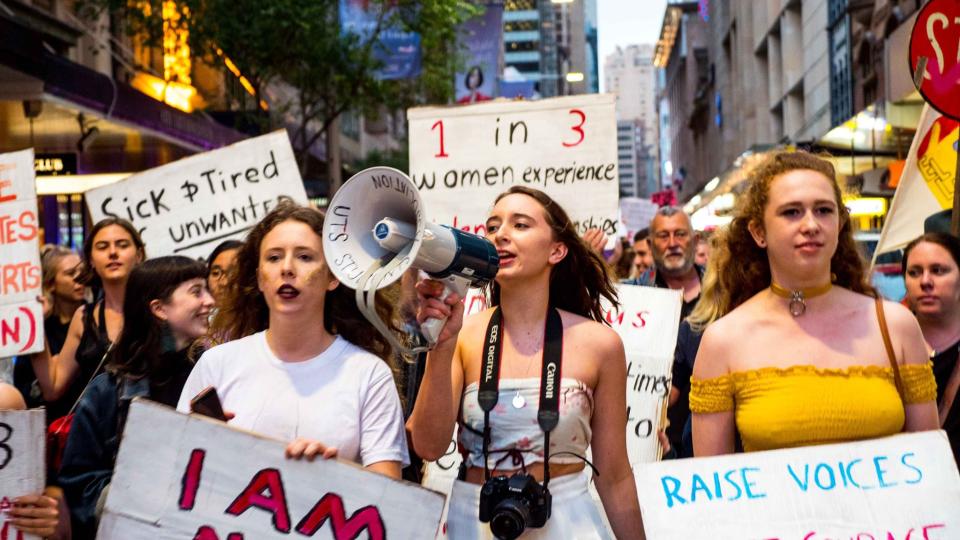Of course, #MeToo

In the wake of US film producer and former studio executive Harvey Weinstein’s outing as a sexual predator, who infamously preyed on young actresses, the hashtag #MeToo, which women are sharing to say that they too have experienced sexual assault or harassment, is now trending as an international discussion ensues about sexual violence and power.
So far more than 12 million women have shared the hashtag.
The hashtag’s instantaneous ascent should shock no one. In Australia, sexual assault figures are the highest for seven years. More than 23,000 people reported being sexually assaulted last year, making it the fifth consecutive year in which recorded sexual assaults rose nationally.
Far from being the fabled shadow in the bushes, the average perpetrator is typically known to us: a friend, acquaintance, family member, coworker or boss. Often, they are our lovers.
And just as the average perpetrator is not necessarily a Harvey Weinstein, the virality of #MeToo shows that the average survivor isn't necessarily a famous movie star either. One in four Australian women has experienced physical or sexual violence at the hands of an intimate partner.
The most common target of sexual violence are girls aged between 10 and 14, followed by young women between 15 and 24 years. Indigenous women, women with disabilities or mental health issues and women in prison are all overrepresented in these statistics as well.
This comes at a time when women’s refuges are facing defunding en masse, such as the NSW Rape Crisis Centre, which is desperately searching for funding to stave off closure. The service is the last around the clock service for survivors of sexual assault in the state. But since the loss of a major government contract, the NGO that manages the service may have to liquidate in order to pay the redundancies of its staff.
As more and more women continue to put their experience of sexual violence on the record — and as we draw near to national Reclaim the Night rallies around the country — we cannot afford to shy away from the question of power.
Institutional misogyny
Our culture protects the Harvey Weinstein’s of the world. Misogyny ensures that most perpetrators of sexual violence against women are never brought before a court, and their violence is rarely known to their community. Those with power — Hollywood film producers, police, politicians — are rarely brought to justice, and this sets the precedent that means family violence, which we suffer at the hands of our partners and family members, is allowed to run rampant as well.
Weinstein has attempted to explain away the allegations by claiming that he is a sex addict. But pathological excuses fall short as an explanation for the scale of rape culture.
Rape isn’t just sex. Rape is sex plus the abuse of power. In reality, plenty of people with sex addictions never rape anyone and plenty of rapists aren’t addicted to sex.
There is no biological reason that men should be more likely to rape women, yet 93% of offenders are male.
Rape culture is not a natural expression of the differences between the sexes, it is a product of institutional misogyny. The outdated claim that men have uncontrollable sexual urges is a get-out-of-jail-free card with no scientific merit.
When women tell their stories, the cry of “me too” is resounding. But we must not let it be the end of the conversation. First, we recognise the problem; next we must find real solutions.
The rise of #MeToo shows that the problem is much broader than any one man. The problem is a system built to keep the powerful in power and their abuses — against the working class, people of colour as well as women — hidden. Even when hidden in broad daylight.
A serious campaign to knock out sexual assault and harassment would start with establishing comprehensive youth education programs about safe, consensual sex; strengthening and enforcing laws against sexual harassment; restoring and increasing funding for women's services to ensure ready access to health centres, rape crisis centres, women's refuges; and a community education campaign in the corporate media, schools and all other public institutions to promote positive, non-stereotyped, anti-sexist images of women.
We can — and should — hold individual perpetrators to account, but until we tear down the system that perpetuates misogyny, more women and girls will see their own brushes with sexual violence reflected in the outpouring of #MeToo.
[Mia Sanders is a member of the National Executive of Socialist Alliance.]